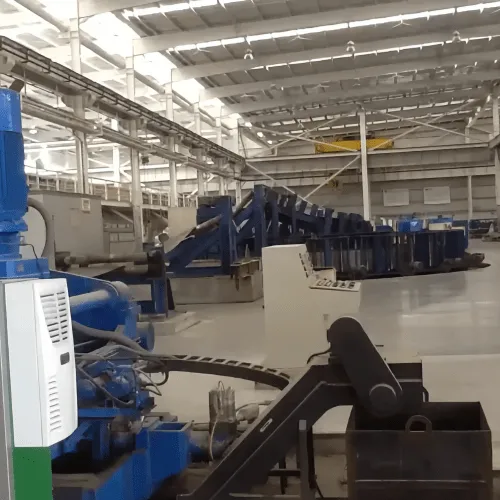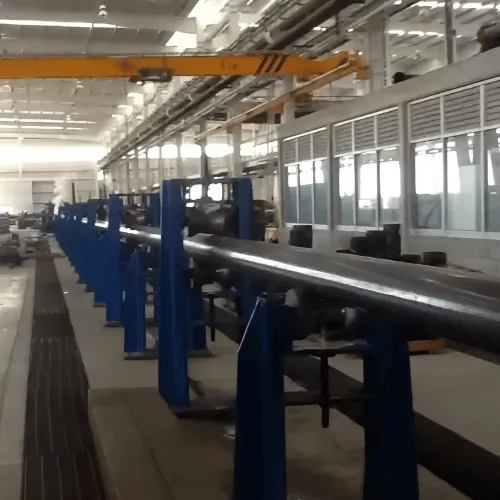Revolutionizing Industrial Production Through Advanced Pipe Manufacturing
The steel pipe making machine stands as a cornerstone of modern industrial manufacturing, transforming the way we produce essential components for construction, oil and gas, and infrastructure development. These sophisticated pieces of equipment have revolutionized the pipe production process, offering unprecedented levels of efficiency, precision, and output capacity. In today's competitive manufacturing landscape, the implementation of advanced steel pipe making machines has become crucial for companies aiming to maintain their competitive edge while meeting growing market demands.
The evolution of steel pipe manufacturing technology has led to remarkable improvements in production capabilities, with modern machines incorporating cutting-edge automation, precision controls, and innovative forming techniques. These advancements have not only enhanced the quality of the final products but have also significantly reduced operational costs and production time, making them an invaluable asset for manufacturers worldwide.
Core Components and Technological Innovations
Advanced Control Systems and Automation
Modern steel pipe making machines feature sophisticated control systems that optimize every aspect of the production process. These systems utilize advanced sensors and monitoring equipment to maintain precise control over critical parameters such as temperature, pressure, and material flow. The integration of programmable logic controllers (PLCs) enables operators to make real-time adjustments and ensure consistent quality throughout the production run.
The automation capabilities of contemporary steel pipe making machines extend beyond basic operations to include complex tasks such as material handling, quality inspection, and packaging. This level of automation significantly reduces human error, increases safety, and enables continuous operation with minimal supervision.
High-Precision Forming Technology
The heart of any steel pipe making machine lies in its forming technology. Latest innovations include advanced roll forming systems that can achieve tighter tolerances and superior surface finishes. These systems employ precisely engineered forming rolls and sophisticated alignment mechanisms to ensure uniform pipe dimensions and structural integrity.
The implementation of servo-driven forming stations allows for quick adjustments and precise control over the forming process, enabling manufacturers to produce pipes of various sizes and specifications with minimal setup time between production runs.
Operational Benefits and Production Advantages
Enhanced Production Speed and Output
One of the most significant advantages of modern steel pipe making machines is their ability to maintain high production speeds while ensuring consistent quality. Advanced machines can achieve production rates several times higher than traditional manufacturing methods, with some systems capable of producing hundreds of meters of pipe per hour. This increased output capacity allows manufacturers to meet larger order volumes and shorter delivery deadlines.
The combination of high-speed operation and reliable quality control systems means that manufacturers can maximize their productivity without compromising on product quality or increasing rejection rates.
Material Optimization and Waste Reduction
Steel pipe making machines incorporate sophisticated material handling and processing systems that minimize waste and optimize material usage. Advanced cutting systems ensure precise length control and clean cuts, reducing material loss during production. Additionally, modern machines feature automatic scrap recovery systems that can recycle and reprocess waste material, further improving cost efficiency.
The ability to maintain tight control over material thickness and dimensional accuracy helps reduce over-specification and material waste, contributing to significant cost savings in raw material consumption.
Quality Assurance and Process Control
Integrated Quality Monitoring Systems
Modern steel pipe making machines incorporate advanced quality monitoring systems that perform continuous inspection throughout the production process. These systems utilize various technologies including laser measurement, ultrasonic testing, and visual inspection systems to detect defects and ensure compliance with quality standards.
Real-time quality data collection and analysis enable immediate corrective actions, reducing the likelihood of producing non-conforming products and minimizing quality-related losses. The integration of quality monitoring systems with production controls ensures consistent product quality and reduces the need for post-production inspection.
Process Documentation and Traceability
Advanced steel pipe making machines feature comprehensive data logging and reporting capabilities that maintain detailed records of production parameters and quality metrics. This information provides valuable insights for process optimization and helps maintain traceability throughout the manufacturing process.
The ability to track and document production parameters helps manufacturers demonstrate compliance with quality standards and regulatory requirements, while also facilitating continuous improvement initiatives.

Economic Impact and Return on Investment
Operational Cost Reduction
The implementation of a modern steel pipe making machine can lead to significant reductions in operational costs through various mechanisms. Lower labor requirements, reduced energy consumption, and minimized material waste contribute to improved cost efficiency. The high level of automation reduces the need for manual intervention, leading to lower labor costs and increased operational efficiency.
Additionally, the improved reliability and reduced maintenance requirements of modern machines help minimize downtime and associated costs, contributing to a better bottom line for manufacturers.
Market Competitiveness and Growth Opportunities
Investing in advanced steel pipe making machines enables manufacturers to enhance their market position through improved product quality, increased production capacity, and greater flexibility in meeting customer requirements. The ability to produce high-quality pipes efficiently and consistently helps build strong customer relationships and opens opportunities for market expansion.
The versatility of modern machines in handling different pipe specifications allows manufacturers to diversify their product offerings and enter new market segments, contributing to sustainable business growth.
Frequently Asked Questions
What is the typical return on investment period for a steel pipe making machine?
The return on investment period typically ranges from 2 to 5 years, depending on factors such as production volume, market conditions, and operational efficiency. Many manufacturers report achieving faster ROI through increased productivity and reduced operational costs.
How does automation in steel pipe making machines impact workforce requirements?
While automation reduces the need for manual labor in direct production tasks, it creates opportunities for skilled positions in machine operation, maintenance, and quality control. This shift typically results in higher efficiency with a more specialized workforce.
What maintenance requirements should be considered for steel pipe making machines?
Modern steel pipe making machines require regular preventive maintenance, including routine inspections, component replacement, and calibration. However, advanced monitoring systems help predict maintenance needs and prevent unexpected downtime, making maintenance more efficient and cost-effective.

